Calls for Foreigners to Leave Lebanon as War Fears Intensify
8 min read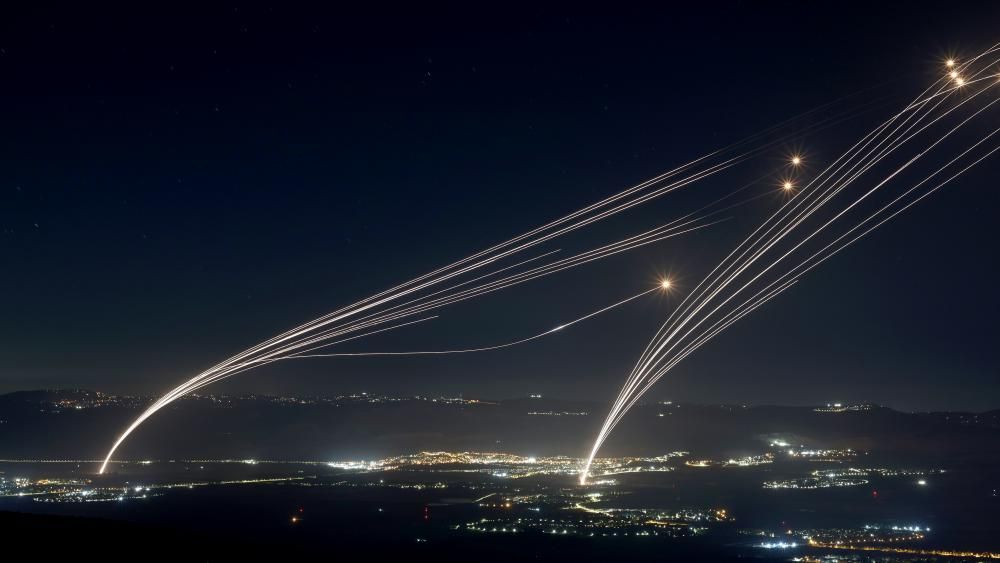
Several countries have urged their nationals to leave Lebanon, as fears grow of a wider conflict in the Middle East.
Iran has vowed “severe” retaliation against Israel, which it blames for the death of Hamas political chief Ismail Haniyeh in Tehran on Wednesday. Israel has not commented.
His assassination came hours after Israel killed Hezbollah senior commander Fuad Shukr in Beirut.
Western officials fear that Hezbollah, an Iran-backed militia and political movement based in Lebanon, could play a key role in any such retaliation, which in turn could spark a serious Israeli response.
Diplomatic efforts by the US and other Western countries continue to try to de-escalate tensions across the region.
A growing number of flights have been cancelled or suspended at the country’s only commercial airport in Beirut.
The US, the UK, Australia, France, Canada, South Korea, Saudi Arabia, Japan, Turkey and Jordan are among the countries to have urged their citizens to leave Lebanon as soon as possible.
Fears of an escalation of hostilities that could engulf Lebanon are at their highest since Hezbollah stepped up its attacks on Israel, a day after the deadly Hamas attacks on southern Israel on 7 October, in support for Palestinians in Gaza.
Most of the violence has been contained to border areas, with both sides indicating not being interested in a wider conflict.
Hezbollah, however, has vowed to respond to Shukr’s assassination, which happened in Dahiyeh, the group’s stronghold in Beirut’s southern suburbs.
It came after 12 children and teenagers were killed in a strike on the Israeli-occupied Golan Heights, which Israel blamed on Hezbollah. Israel said Shukr was the behind it.
Meanwhile there has been continuing firing between the two sides. Hezbollah said it launched drones at a military barracks in Ayelet HaShahar, northern Israel, in the early hours of Monday morning. The Israeli military said two soldiers were wounded.
It came a day after Hezbollah launched dozens of rockets at the nearby town of Beit Hillel. There were no reports of casualties from that attack.
Israel’s air force responded by striking targets in southern Lebanon. A Hezbollah fighter and a paramedic were killed in a strike on the town of Mays al-Jabal, less than a mile from the border with Israel.
In a separate development on Sunday morning, two people were killed in a stabbing attack in the Israeli city of Holon. The attacker, a Palestinian from the occupied West Bank, was later “neutralised”, police said.
Also on Sunday, officials from the Hamas-run ministry of health in Gaza said an Israeli air strike had hit a tent inside a hospital, killing at least five people. The officials said 19 Palestinians had been killed across the day.
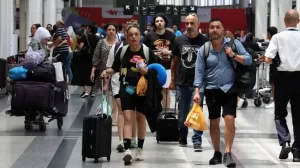
In a statement on Saturday, the US embassy in Beirut said those who chose to stay in Lebanon should “prepare contingency plans” and be prepared to “shelter in place for an extended period of time”.
The Pentagon has said it is deploying additional warships and fighter jets to the region to help defend Israel from possible attacks by Iran and its proxies, a strategy similar to the one adopted in April, when Iran launched more than 300 missiles and drones at Israel in retaliation to an attack on its diplomatic compound in Syria.
It blamed Israel for that strike.
Many fear Iran’s retaliation on this occasion could take a similar form.
The UK says it is sending extra military personnel, consular staff and border force officials to help with any evacuations.
It has urged UK citizens to leave Lebanon while commercial flights are running.
Two British military ships are already in the region and the Royal Air Force has put transport helicopters on standby.
UK Foreign Secretary David Lammy said the regional situation “could deteriorate rapidly”.
In a phone call with EU Foreign Policy Chief Josep Borrell on Friday, Iran’s Acting Foreign Minister Ali Baqeri Kani said Iran would “undoubtedly use its inherent and legitimate right” to “punish” Israel.
On Friday, an announcer on Iran’s state TV warned “the world would witness extraordinary scenes”.
Israeli Prime Minister Benjamin Netanyahu has warned Israelis that “challenging days lie ahead… We have heard threats from all sides. We are prepared for any scenario”.
Tensions escalated after a rocket strike on a football pitch in the occupied Golan Heights killed 12 children and teenagers.
Israel accused Hezbollah and vowed “severe” retaliation, though Hezbollah denied it was involved.
Days later, Shukr, who was a close adviser to the Hezbollah leader Hassan Nasrallah, was killed in a targeted Israeli air strike in Beirut. Four others, including two children, were also killed.
Hours after that, Hamas chief Ismail Haniyeh was assassinated in Iran, Hamas’s main backer. He was visiting to attend the inauguration of Iran’s new president, Masoud Pezeshkian.
Iran’s Supreme Leader, Ayatollah Ali Khamenei, has said Israel will suffer a “harsh punishment” for the killing.
Haniyeh’s assassination dealt a blow to the negotiations for a ceasefire and hostage release deal in Gaza, the main hope to defuse tensions along the Lebanon-Israel border.
The war began in October when Hamas carried out an unprecedented attack on Israel, killing about 1,200 people and taking 251 others back to Gaza as hostages.
The attack triggered a massive Israeli military response, which has killed at least 39,480 Palestinians in Gaza, according to the territory’s Hamas-run health ministry.
Several nations have advised their citizens to evacuate Lebanon amid escalating apprehensions of a broader conflict in the Middle East.
Iran has pledged a “severe” response against Israel, holding them accountable for the demise of Hamas political leader Ismail Haniyeh in Tehran. Israel has refrained from commenting on the matter.
The incident occurred shortly after Israel eliminated Hezbollah’s high-ranking commander Fuad Shukr in Beirut.
Western authorities are concerned that Hezbollah, a Lebanese-based militia and political entity backed by Iran, could potentially trigger a significant Israeli retaliation, leading to further escalation.
Diplomatic initiatives led by the United States and other Western countries persist in attempting to de-escalate tensions across the region.
A surge in cancelled or suspended flights has been observed at Beirut’s sole commercial airport.
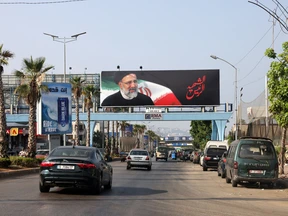
The United States, the United Kingdom, Australia, France, Canada, South Korea, Saudi Arabia, Japan, Turkey, and Jordan are among those urging their nationals to depart Lebanon promptly.
Apprehensions of an intensification of hostilities engulfing Lebanon have peaked since Hezbollah intensified its assaults on Israel, following the deadly Hamas attacks on southern Israel on October 7, in solidarity with Palestinians in Gaza.
The majority of the violence has been contained within border regions, with both sides indicating a lack of interest in a wider conflict.
Nonetheless, Hezbollah has vowed to retaliate against Shukr’s assassination in Dahiyeh, the organization’s stronghold in Beirut’s southern suburbs.
This development followed the deaths of 12 children and teenagers in an attack on the Israeli-occupied Golan Heights, which Israel attributed to Hezbollah, claiming Shukr’s involvement.
Meanwhile, ongoing exchanges of fire between the two factions have persisted. Hezbollah reported launching drones at a military facility in Ayelet HaShahar, northern Israel, early Monday morning. The Israeli military confirmed two soldiers injured in the attack.
This action followed Hezbollah’s launch of numerous rockets at the nearby town of Beit Hillel. No casualties were reported from this assault.
In response, Israel’s air force targeted locations in southern Lebanon. A Hezbollah combatant and a paramedic lost their lives in an airstrike on the town of Mays al-Jabal, situated less than a mile from the Israeli border.
In a separate incident on Sunday morning, two individuals perished in a stabbing incident in Holon, Israel. The assailant, a Palestinian hailing from the occupied West Bank, was subsequently subdued, as per police reports.
On the same day, officials from the Hamas-led health ministry in Gaza disclosed that an Israeli airstrike had hit a tent within a hospital, resulting in at least five fatalities. The officials reported a total of 19 Palestinian deaths throughout the day.
In a statement issued on Saturday, the US embassy in Beirut advised residents remaining in Lebanon to formulate contingency plans and be prepared for potential extended periods of sheltering in place.
The Pentagon confirmed the deployment of additional warships and fighter jets to the region to bolster Israel’s defense against potential attacks from Iran and its proxies, adopting a strategy akin to the one employed in April when Iran retaliated against an attack on its diplomatic compound in Syria by launching over 300 missiles and drones at Israel, attributing the strike to Israel.
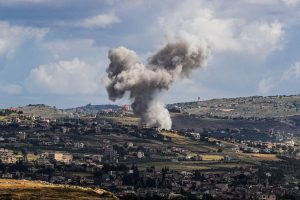
There are concerns that Iran’s retaliation this time around may mirror previous actions.
The United Kingdom announced the dispatch of supplementary military personnel, consular staff, and border force personnel to facilitate potential evacuations. British citizens have been advised to exit Lebanon while commercial flight services are operational.
Two British military vessels are already positioned in the region, with the Royal Air Force placing transport helicopters on standby.
UK Foreign Secretary David Lammy cautioned of a potential rapid deterioration in the regional situation.
During a phone conversation with EU Foreign Policy Chief Josep Borrell on Friday, Iran’s Acting Foreign Minister Ali Baqeri Kani affirmed Iran’s intention to exercise its inherent and legitimate right to “punish” Israel.
On the same day, an announcer on Iran’s state television forewarned of “extraordinary scenes” that the world may witness.
Israeli Prime Minister Benjamin Netanyahu cautioned Israelis of impending challenges, stating, “We have received threats from various quarters. We are prepared for any eventuality.”
Tensions heightened following a rocket strike on a football field in the occupied Golan Heights that claimed the lives of 12 youths.
Israel accused Hezbollah of the attack and vowed a “severe” response, despite Hezbollah denying involvement.
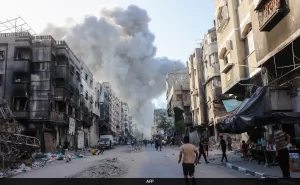
Subsequently, Shukr, a close advisor to Hezbollah leader Hassan Nasrallah, fell victim to a targeted Israeli airstrike in Beirut. The incident resulted in the fatalities of four individuals, including two children.
Shortly after, Hamas chief Ismail Haniyeh was assassinated during his visit to Iran, a key supporter of Hamas. The assassination disrupted negotiations for a ceasefire and the release of hostages in Gaza, a crucial initiative aimed at diffusing tensions along the Lebanon-Israel border.
The conflict commenced in October when Hamas launched an unprecedented offensive against Israel, resulting in approximately 1,200 casualties and the abduction of 251 individuals to Gaza.
The ensuing massive Israeli military response has reportedly led to at least 39,480 Palestinian fatalities in Gaza, according to the territory’s Hamas-administered health ministry.








